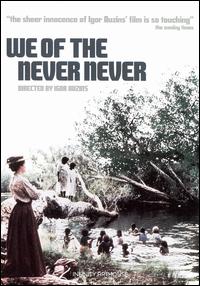We of the Never Never (film)
| We of the Never Never | |
|---|---|
 |
|
| Directed by | Igor Auzins |
| Produced by | Greg Tepper |
| Written by | Peter Schreck |
| Story by | Jeannie Gunn |
| Based on | We of the Never Never |
| Starring |
Angela Punch McGregor Arthur Dignam John Jarratt Tony Barry |
| Music by | Peter Best |
| Cinematography | Gary Hansen |
| Edited by | Clifford Hayes |
|
Production
company |
|
| Distributed by |
Umbrella Entertainment Hoyts Distribution |
|
Release date
|
28 October 1982 (world premiere)
|
|
Running time
|
134 minutes (original cut) 121 mins (commercial release) |
| Country | Australia |
| Language | English |
| Budget | AU$3.2 million |
| Box office | AU $3,112,000 (Australia) |
We of the Never Never is a 1982 Australian drama film, directed by Igor Auzins, based on the autobiographical novel We of the Never Never by Jeannie Gunn. It was nominated for five AFI awards and won one award for best cinematography.
The film focusses on the life of Jeannie, a woman from the upper classes of society, and her story of adapting to life in the outback of Australia. Following her marriage to Aeneas Gunn who has just bought a 1 million acre cattle station near Mataranka, called Elsey Station, Jeannie follows him from Melbourne in 1902. Some of the drovers were unhappy at first because they believed that the bush is no place for a white woman. As such, they were both wary of her and made fun of her when both she and her husband arrived. However, Jeannie was determined to prove them wrong.
While her husband was away with the other men herding the cattle, Jeannie begins making friends with the Aboriginal people. Her husband and the other white men treated the local people (and Chinese workers) as inferior to them, often regarding them as lazy, indifferent, as well as unreliable. Jeannie however is sympathetic, often giving them food, or trying to stop domestic disputes.
Later, Aeneas goes on a cattle muster and asks Jeannie to come along, which she does gladly. However the trip is difficult for her, riding side-saddle, she is also nearly attacked by a rogue bull. However, as time passes, things improve at the station - the house is expanded, a new Chinese cook arrives, a garden is planted, as well as her belongings finally arrive from Melbourne.
But boredom sets in as she assumes her place - that of the station master's wife. She is asked not to help a feverish yet dying man, or to interfere with the balance of things, or to give the Aboriginal people goods meant for the working men. As a result, she spends more time with the locals, since she longs to learn and understand more about their ways. Jeannie even takes a semi-orphaned mixed-heritage child called Bett-Bett under her wing, much to the dismay of her husband.
Over time Jeannie gains the respect of the Aboriginal people and they slowly open up to her. At one point, Goggle Eye, an elder Aboriginal male, allows her to watch an Aboriginal dance. The stockmen however interrupt the "heathen" dance, shooting and shouting "God save King Edward". Later, Bett-Bett goes on walkabout and Goggle Eye becomes ill and feverish. Believing that he has been affected by a singing curse Goggle Eye passes away. The stockmen feel some mixed remorse, acknowledging their role in his death.
...
Wikipedia
